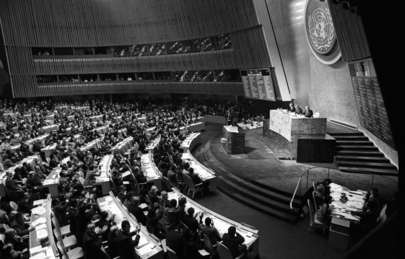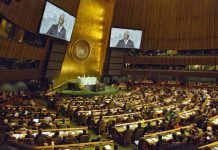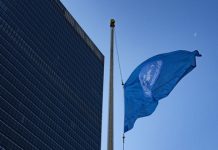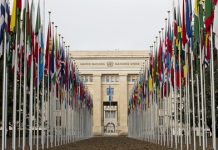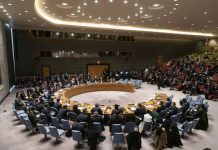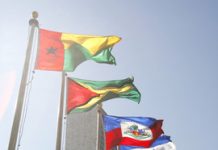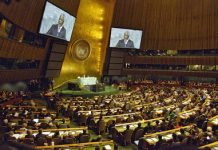Many Palestinians hope Hamas leader’s death will end conflict, says UN aid agency
Many Palestinians hope that the death of Hamas leader Yahya Sinwar will bring a halt to the fighting in Gaza, UN humanitarians said on Friday, after Israel confirmed that the militant had been killed in southern Gaza earlier this week.
Here’s James Elder from the UN Children’s Fund, UNICEF, speaking in Geneva:
“I had multiple reports from civilians on the ground, from young people I had met who thought this would mean the end of the war and whose emotions responded because they felt now the war would finally be over. That was their feeling.”
UN aid agencies warn that the situation across Gaza is worse than ever. OCHA, the UN aid coordination office, said that “ongoing Israeli military operations” in northern Gaza are putting tens of thousands of civilians in grave danger.
People already face evacuation orders and loss of access to water, sanitation and hygiene facilities in northern Gaza, where UN aid partners report that water production from municipal wells is “currently zero” in Jabaliya and Beit Lahya.
According to UNICEF, only 80 trucks carrying food and water assistance have been allowed into northern Gaza since 2 October. It said that the situation for children in Gaza is “at rock bottom”.
Lebanon: Peacekeepers pledge to stay, doing ‘whatever they can to help’
Despite ongoing heavy shelling across the UN-patrolled Blue Line separating southern Lebanon and Israel, the UN peacekeeping force stationed there has said it will stay to fulfil its mandate from the Security Council and assist civilians wherever possible.
In recent days, troops from UNIFIL, the UN Interim Force in Lebanon, have been injured by Israeli military operations, including a strike on an observation tower.
On Thursday, the peacekeepers reported that that one of its ships off the southern Lebanese coast had intercepted and downed a drone that approached from the south and came within a few metres of the vessel.
Both the Israel Defense Forces (IDF) and Israeli Prime Minister Benjamin Netanyahu had called on UNIFIL to move further away from the Blue Line.
UNIFIL spokesperson Andrea Tenenti said that the Force’s more than 50 troop-contributing countries were “unanimous” about staying:
“We are seeing at the moment hundreds of trajectories, and sometimes more, crossing the Blue Line each day…We need to be here, we need to try to bring back stability and peace to this region.”
Mr. Tenenti insisted that several incidents involving the Israeli military that had injured peacekeepers, damaged surveillance cameras and perimeter walls were “of course” a violation of the 2006 UN Security Council resolution that led to the current deployment along a buffer zone.
Asked whether peacekeepers were authorized to defend themselves if they come under attack, Mr. Tenenti said that under chapter six of the UN Charter, “self-defence can be used…but we also have to be very pragmatic…because we don’t want to become part of the conflict and use force that would trigger more violence”.
West Bank Palestinians facing deadly ‘war-like tactics’, warns OCHA
To the occupied West Bank, where Palestinians continue to face “war-like tactics”, the UN aid coordination office, OCHA, said on Friday.
According to OCHA, from 8 to 14 of October, Israeli forces in the West Bank killed nine Palestinians, including a child. Another 104 were injured, including nine children.
“Israeli forces accused most of those fatalities of being involved in attacking Israelis,” said OCHA spokesperson Jens Laerke.
The olive harvest which takes place during October and November and is “an economic lifeline for tens of thousands of Palestinian families in the West Bank” has also been targeted, Mr. Laerke warned, with hundreds of olive trees and saplings “vandalized, sawed off, or stolen”.
“Yesterday, a Palestinian woman was reportedly killed while she was harvesting olives in Jenin. This follows 32 attacks by Israeli settlers this month on Palestinians engaged in the ongoing olive harvest happening right now.”
Mr. Laerke said that although there has been settler violence for “a very long time, this year is extraordinary”.
He noted that about 160,000 people have had their work permits for Israel cancelled, depriving families of livelihoods and income.
The UN World Food Programme has already warned about rising hunger in the West Bank, projecting that at least 600,000 people could be pushed into food insecurity if the situation continues to worsen.
Daniel Johnson, UN News
Music composed and produced by Joachim Harris. All rights reserved.
Source of original article: United Nations (news.un.org). Photo credit: UN. The content of this article does not necessarily reflect the views or opinion of Global Diaspora News (www.globaldiasporanews.com).
To submit your press release: (https://www.globaldiasporanews.com/pr).
To advertise on Global Diaspora News: (www.globaldiasporanews.com/ads).
Sign up to Global Diaspora News newsletter (https://www.globaldiasporanews.com/newsletter/) to start receiving updates and opportunities directly in your email inbox for free.


